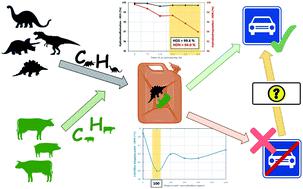当前位置:
X-MOL 学术
›
Sustain. Energy Fuels
›
论文详情
Our official English website, www.x-mol.net, welcomes your
feedback! (Note: you will need to create a separate account there.)
Animal fats as a suitable feedstock for co-processing with atmospheric gas oil
Sustainable Energy & Fuels ( IF 5.0 ) Pub Date : 2021-09-02 , DOI: 10.1039/d1se00917f Héctor de Paz Carmona 1 , Aleš Vráblík 1 , José Miguel Hidalgo Herrador 1 , Romana Velvarská 1 , Radek Černý 1
Sustainable Energy & Fuels ( IF 5.0 ) Pub Date : 2021-09-02 , DOI: 10.1039/d1se00917f Héctor de Paz Carmona 1 , Aleš Vráblík 1 , José Miguel Hidalgo Herrador 1 , Romana Velvarská 1 , Radek Černý 1
Affiliation

|
Nowadays, the co-processing of middle distillates with vegetable oils is well established at an industrial scale. However, it is necessary to utilize waste oils (used cooking oils/animal fats) to obtain second-generation biofuels. The present work studies the suitability of animal fat as a feedstock for co-processing with atmospheric gas oil, paying particular attention to catalyst activity in terms of hydrotreating effectiveness and hydrotreated gas oil quality, including cold flow properties. The co-processing experiment was carried out in a fixed bed reactor for more than 260 hours, under industrial operating conditions (362–377 °C, 5.8 MPa, LHSV 1 h−1, H2 317 Nm3 m−3) and an atmospheric gas oil/animal fat ratio of 90/10 wt%. The addition of animal fats did affect the hydrodesulfurisation efficiency (>99.6%). However, the co-processing affected the hydrodenitrogenation efficiency (>94.0%) more and the hydrotreated gas oil quality in the longer term. Furthermore, in the case of cold flow properties, 100 ppm seems to be the optimal value for depressant additivation to improve significantly the CFPP value (up to 10 °C). Overall, our results suggest that, while it is necessary to implement a previous cleaning step, animal fats are a suitable and promising blending feedstock candidate for co-processing with medium distillates to produce advanced biofuels.
中文翻译:

动物脂肪作为适合与常压瓦斯油协同加工的原料
如今,中间馏分油与植物油的协同处理已在工业规模上得到很好的确立。然而,需要利用废油(用过的食用油/动物脂肪)来获得第二代生物燃料。目前的工作研究了动物脂肪作为与常压瓦斯油协同加工的原料的适用性,特别关注加氢处理效率和加氢处理瓦斯油质量(包括冷流特性)方面的催化剂活性。协同处理实验在固定床反应器中进行了 260 多个小时,在工业操作条件下(362-377 °C,5.8 MPa,LHSV 1 h -1,H 2 317 Nm 3 m -3) 和 90/10 wt% 的大气瓦斯油/动物脂肪比率。动物脂肪的添加确实影响了加氢脱硫效率(>99.6%)。然而,协同处理对加氢脱氮效率(>94.0%)和加氢处理瓦斯油质量的长期影响更大。此外,在冷流特性的情况下,100 ppm 似乎是抑制剂添加的最佳值,以显着提高 CFPP 值(高达 10 °C)。总体而言,我们的结果表明,虽然有必要实施先前的清洁步骤,但动物脂肪是一种合适且有前途的混合原料候选者,可与中等馏分油进行协同处理以生产先进的生物燃料。
更新日期:2021-09-02
中文翻译:

动物脂肪作为适合与常压瓦斯油协同加工的原料
如今,中间馏分油与植物油的协同处理已在工业规模上得到很好的确立。然而,需要利用废油(用过的食用油/动物脂肪)来获得第二代生物燃料。目前的工作研究了动物脂肪作为与常压瓦斯油协同加工的原料的适用性,特别关注加氢处理效率和加氢处理瓦斯油质量(包括冷流特性)方面的催化剂活性。协同处理实验在固定床反应器中进行了 260 多个小时,在工业操作条件下(362-377 °C,5.8 MPa,LHSV 1 h -1,H 2 317 Nm 3 m -3) 和 90/10 wt% 的大气瓦斯油/动物脂肪比率。动物脂肪的添加确实影响了加氢脱硫效率(>99.6%)。然而,协同处理对加氢脱氮效率(>94.0%)和加氢处理瓦斯油质量的长期影响更大。此外,在冷流特性的情况下,100 ppm 似乎是抑制剂添加的最佳值,以显着提高 CFPP 值(高达 10 °C)。总体而言,我们的结果表明,虽然有必要实施先前的清洁步骤,但动物脂肪是一种合适且有前途的混合原料候选者,可与中等馏分油进行协同处理以生产先进的生物燃料。











































 京公网安备 11010802027423号
京公网安备 11010802027423号